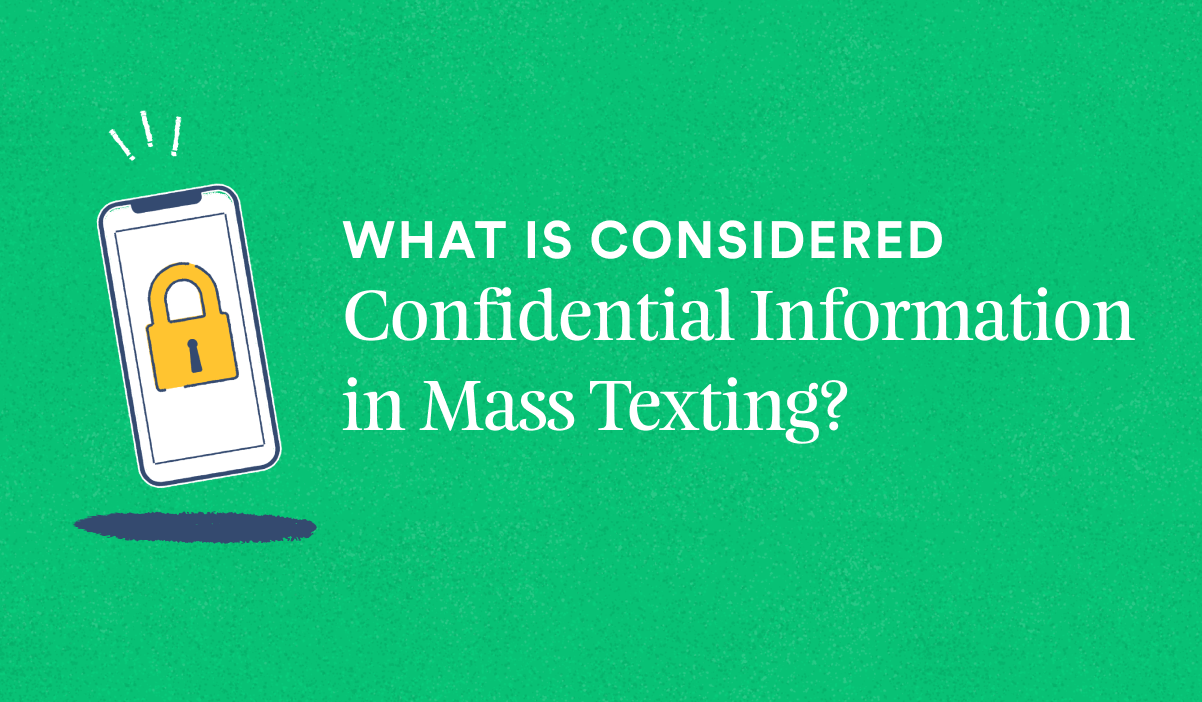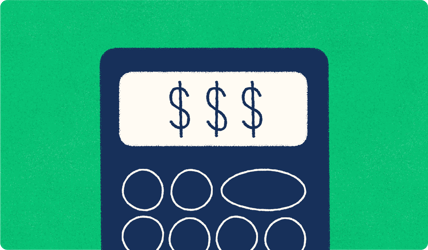3 min read
What is Considered Confidential Information in Mass Texting?
![]() Kaitlyn Orred
:
Jan 11, 2024
Kaitlyn Orred
:
Jan 11, 2024

Mass text messaging is a powerful tool that keeps businesses connected with their audience in real time. But, with great power comes great responsibility, especially when it comes to protecting confidential information.
Mishandling confidential information can result in significant consequences, including harm to the company's reputation, legal troubles, and a loss of customer trust.
Let's learn more about confidential information and how to handle it properly.
Confidential Information vs. Public Information
It's crucial to know the difference between confidential and public information. Some data may seem harmless alone, but when combined, it can reveal private details and put your contacts at risk. Understanding this difference is vital for protecting privacy.
What is Confidential Information?
In mass texting, confidential information encompasses a spectrum of data that, if disclosed, could compromise an individual's privacy or security. This includes personal details like names, contact numbers, private conversations, medical records, and financial data. We’ll go into a complete list of examples below.
It's essential to recognize that not all confidential information is equally sensitive. Personal and financial data, for instance, is highly critical, whereas an email address may be less important. Understanding these varying levels of sensitivity aids in effectively safeguarding the data.
What is Public Information?
Public information refers to data intentionally made available to the general public. This can include information published on websites, official documents, and government records. While public knowledge is accessible to anyone, it is essential to understand how sharing seemingly harmless details can have a significant impact.
Examples of Confidential Information
Confidential information goes beyond examples that come to mind immediately, such as bank account numbers and social security numbers. However, knowing all types is essential to protect your customers’ information appropriately.
Here are some examples:
Personal Information
- Full names
- Date of birth
- Home addresses
- Social security numbers
- Personal phone numbers
Financial Information
- Bank account numbers
- Credit card information
- Income details
- Tax information
Health Information
- Medical records
- Health insurance details
- Employment Information
- Salary details
- Job titles
- Performance reviews
- Employment contracts
Legal Information
- Divorce papers
- Wills
- Lawsuits
Business Related Information
- Trade secrets
- Business plans
- Client lists
- Vendor contracts
- Proprietary software or technology
Education Records
- Transcripts
- Admission applications
- Disciplinary records
Laws and Regulations Protecting Confidential Data
For businesses using mass text messaging, following the laws protecting people's private information is crucial. Here are some fundamental rules you need to know.
1. Telephone Consumer Protection Act (TCPA):
The TCPA is a U.S. law that says businesses must get written permission before sending automated marketing messages. Following TCPA laws helps avoid legal problems and ensures people trust your messages.
As a reminder, Text-em-All does not allow marketing, promotional, or sales messages to be sent from our platform. Read our responsible use policy to learn more about what messages we allow.
2. General Data Protection Regulation (GDPR):
GDPR is a law in Europe that protects people's personal data. If you send messages to people in Europe, you must follow GDPR rules. This includes getting explicit permission, giving people access to their data, and keeping their information safe.
3. California Consumer Privacy Act (CCPA):
If your business is in California, CCPA is a big deal. It gives people in California the right to know what information companies have about them and control how it's used. Following CCPA rules is vital to avoid fines and keep the trust of your California customers.
4. HIPPA and PHI
In healthcare, it's important to understand and follow the Health Insurance Portability and Accountability Act (HIPAA). HIPAA ensures the confidentiality and security of Personal Health Information (PHI), covering a broad spectrum of details such as health conditions, treatment plans, medical history, and any other data that could be linked to an individual's health.
5. Industry-Specific Rules:
Some industries, like healthcare and finance, have their own rules. For example, in healthcare, there's HIPAA, and in finance, there's GLBA. If you're in these industries, you have extra rules to follow.
6. Data Breach Notification Laws:
Many places have laws that say businesses must tell people if there's been a data breach. Knowing and following these laws is essential for honest and quick communication if there's a problem.
Best Practices for Protecting Confidential Information
To safeguard confidential information, businesses should follow these best practices:
Make the data anonymous
To protect privacy, businesses should remove personal details, like names or contact information, when using mass text messaging.
Use a secure messaging platform
Choosing a secure messaging platform with strong encryption is vital to keep sensitive data safe during mass texting.
Obtain consent before collecting data
It's crucial to get permission from individuals before collecting, storing, or using their confidential information, no matter what kind of data it is.
Regularly audit your data security measures
Regularly reviewing and updating security measures is crucial for businesses. This process helps ensure that protective measures remain effective and aligned with evolving standards.
Safeguarding Trust Through Responsible Messaging
Respecting and safeguarding confidential information isn't merely a guideline – it's the bedrock of building and maintaining customer trust. As your business leverages mass text messaging, prioritizing privacy and adhering to the rules is non-negotiable.
For a seamless blend of effective communication and confidentiality assurance, look no further than Text-Em-All. Our service goes beyond just messages – we prioritize privacy, ensuring that businesses utilize mass messaging responsibly.
Create your free account today and take the next step in responsible communication.












